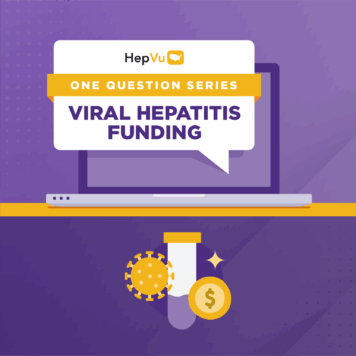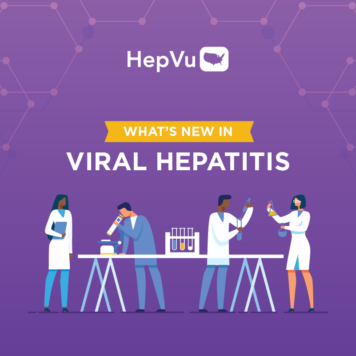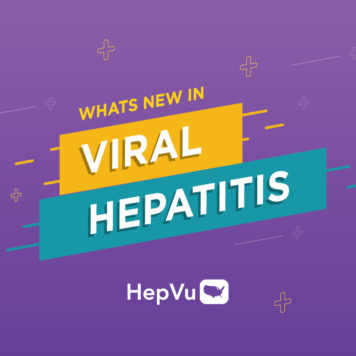Kate Moraras is the Senior Program Director at the Hepatitis B Foundation and the Director of Hep B United.
Q: An estimated 20,900 people were newly diagnosed with acute Hepatitis B in 2016, but many Americans don’t even know that Hepatitis B is an issue. How do you address that knowledge gap and what do you think we can do to improve?
A: The fact that Hepatitis B doesn’t seem like a significant issue to the mainstream or within communities that are personally affected is a huge problem. The United States Department of Health & Human Services (HHS) released the Action Plan for the Prevention, Care & Treatment of Viral Hepatitis in 2011 to combat Hepatitis B. Following its release, my organization, the Hepatitis B Foundation and our partner, the Association of Asian Pacific Community Heatlh Organizations (AAPCHO), founded Hep B United, a national coalition dedicated to reducing the health disparities associated with Hepatitis B by increasing awareness, screening, vaccination, and linkage to care for high-risk communities across the United States. Together, we developed a community-based plan to tackle Hepatitis B. We started with 15 people and now the coalition includes over 36 organizations including 22 local community coalitions across 18 states and 23 cities.
Together, we want to address chronic Hepatitis B infection in communities that are highly impacted, such as the Asian American, Pacific Islander, and African immigrant communities. Asian Americans and Pacific Islanders (AAPI) make up 50 percent of the Hepatitis B burden. They have liver cancer rates that are 13 times higher than among Caucasian populations. We focus on helping these vulnerable communities with testing, vaccinating, and linking them to care, but we still face a lot of barriers when attempting to increase awareness due to cultural stigma and discrimination associated with Hepatitis B.
There has indeed also been a rise in new acute Hepatitis B infections recently, many of which are tied to injection drug use. We are trying to make sure organizations that have not historically worked on Hepatitis B—because it wasn’t impacting the populations or communities they served—are testing and increasing awareness. The recent spike in acute hepatitis B infection also reveals major gaps in, and the need to, increase adult hepatitis B vaccination coverage.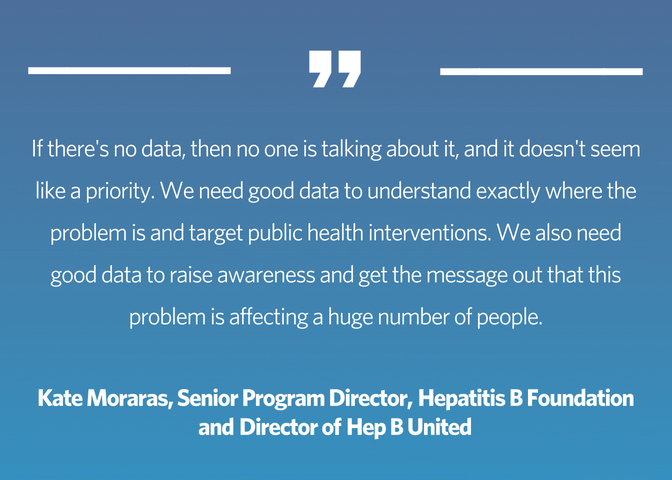
Q: In May 2017, the Hepatitis B Foundation launched the #justB storytelling campaign, the first national, multilingual campaign to put a face on the problem of Hepatitis B. Can you tell us more about this initiative and what you hope to achieve?
A: #justB was created to collect personal stories and empower people who are living with Hepatitis B or liver cancer, as well as their family members, to combat the stigma and discrimination surrounding the disease. A lot of the stigma attached to chronic Hepatitis B infection is tied to nuances and misconceptions in certain communities.
Getting stories out there humanizes the disease. We have stories about Asian American communities, stories related to adopting a child with Hepatitis B, and stories of family members who have lost loved ones to liver cancer. We also have been reaching out to communities with limited English proficiency, sharing stories in Chinese, Korean, Vietnamese, Khmer, Tagalog, and in African languages including Twi and Yoruba.
Last May we had a Congressional briefing focused on finding a cure for Hepatitis B and some of our storytellers were there to share their testimonials in person and it was very powerful.
Q: Asian-American and Pacific Islander and African immigrants are at high risk for contracting Hepatitis B, and every community differs in terms of language, cultural practices, and health care beliefs. How do you make change at the federal level that is fit to address local problems?
A: Federal agencies need to dedicate resources to organizations that can access communities at high risk, like Asian American and African immigrant communities. During Dr. Howard Koh’s tenure at HHS, a lot of progress was made towards this goal. HHS created a strategic plan in coordination with CDC’s “Know Hepatitis B” campaign. The “Know Hepatitis B” campaign develops materials that are culturally and linguistically sensitive to highly impacted communities. It is the only multi-lingual communications campaign focusing on Hepatitis B at a national level. It targets ethnic media, which plays a huge role in reaching these communities and encouraging them to get tested for Hepatitis B.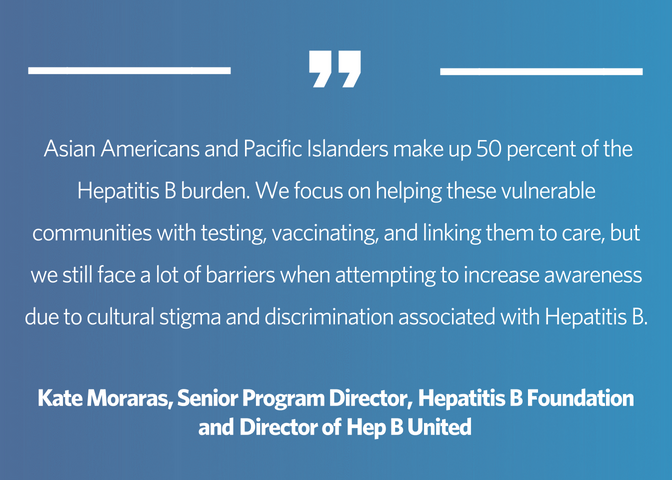
Q: HepVu seeks to visualize viral hepatitis across the U.S. to help people understand the epidemic where they live. High-quality Hepatitis B data can be hard to come by though. What role do you see data playing in addressing the epidemic and what needs to be done to make progress on that front?
A: There’s a saying, “If there’s no data, there’s no problem.” That’s been a huge issue for Hepatitis B and hepatitis in general. If there’s no data, then no one is talking about it, and it doesn’t seem like a priority. The U.S. does not have the funding to create a national chronic surveillance system. We need good data to understand exactly where the problem is and target public health interventions. We also need good data to raise awareness and get the message out that this problem is affecting a huge number of people.
Q: The HHS National Viral Hepatitis Plan was updated in 2017, with ambitious goals for prevention, testing, and treatment. As of today, how do we stand on these?
A: The plan’s initial goal, to put viral hepatitis on the map and make it a part of the national conversation, was wonderful. However, I think that a lot of the strategies in the plan have been hard to see through because there is not enough funding. Setting ambitious goals has helped energize and bring together people around the country to address Hepatitis collectively. At Hep B United, we used the original Viral Hepatitis Plan when we were first created to guide our strategy and work. It helped us ask ourselves how we could contribute to those national goals.
Q: What do you hope to see people doing on National Hepatitis Testing Day? Do the Hepatitis B Foundation and Hep B United have any plans?
A: We have activities going on throughout the month of May to raise awareness of Hepatitis B testing and treatment. We have a webinar on May 17th at 3:00 PM that will feature seven new #justB stories and three of our storytellers will be sharing their stories directly with the audience. We will also have a social media campaign going on throughout the month called #HepBeLIeVER, which is an awareness and social media contest that encourages people to go on Twitter and Facebook and post photos of themselves with their hand over their liver. Finally, for Hepatitis Testing Day, we have developed a “Hep B United Directory”, which helps people find locations to get tested in their city.

